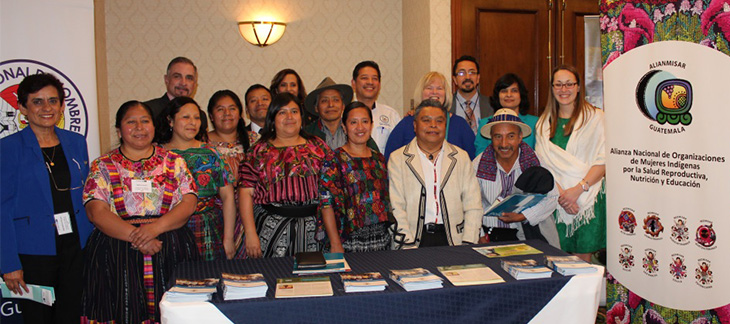The Health Policy Project ended in 2016. Work continued under Health Policy Plus (HP+) until 2022.
NEWS & VIEWS

Photo by the Health Policy and Education Project
February 24, 2016
GUATEMALA CITY, Guatemala—The USAID-funded Health and Education Policy Project (HEPP) hosted an event on February 18 to mark the program’s conclusion and launch its successor, Health and Education Policy Plus (HEP+). The event brought together more than 150 people from USAID, HEPP, and partners, as well as representatives from government ministries and civil society organizations. HEPP and HEP+ are Guatemala-specific country programs of the Health Policy Project (HPP) and Health Policy Plus (HP+), tailored to include education components.
Herminia Reyes, HEPP/HP+ program director, stressed the importance of cooperation and dialogue to the project’s accomplishments: “[It] has been an incredible opportunity for working in a complex environment … managing the relationship between two parties that commonly conflict—government and civil society.”
Mirna Montenegro, a civil society activist and leader of Guatemala’s Reproductive Health Watchdog, looked forward to the role of HEP+ in Guatemala’s continued development. “The launch of HEP+ is an opportunity for civil society to continue working to better the state of maternal health and the right to ... contraceptive services based on human rights and the empowerment of women. Guatemala is at a point in its history that it needs this program which brings information, technology, and decentralization to our institutions and to civil society and strengthens our policy dialogue skills.”
The event also featured presentations by William Brands, mission director, USAID/Guatemala; Linda Cahaelen, USAID health development officer and agreement officer’s representative for HPP/HP+; Suneeta Sharma, director of HPP/HP+; and Reyes. Formal presentations were followed by two 30-minute panel discussions—“Institutional Mechanisms for Transparency and Accountability” and “Citizen Participation and Social Development”—featuring representatives from government ministries and civil society networks.
Over the past five years, HEPP contributed technical assistance around health, nutrition, and educational policies, and strengthened Guatemala’s investments in social development. With this support, the country’s government and civil society oversaw improvements in transparency, accountability, gender equity, and multiculturalism. In the health sector, HEPP helped strengthen the legal framework for contraceptives purchases, saving money for the government and improving the reliability of supply. Implementation of the Healthy Motherhood Law resulted in more and improved spaces for delivery, as well as the training of birthing staff who speak local languages.
In the education sector, HEPP revised the Ministry of Education’s teacher training requirements; more than 4,000 teachers have graduated under the new system, which requires an additional two years of education relative to previous standards. Elsewhere, new scholarship mechanisms make it easier for rural children to complete the ninth grade. HEPP also targeted improved governance, assisting with the creation of new systems designed to empower government officials with timely and accurate data.
HEPP’s successor, HEP+, will build on previous results and drive further innovation, with continued emphasis on gender equality, capacity development, and sustainability. The new project’s technical focus will include support for health financing efforts, as well as local-level implementation of a health sector decentralization framework. Additionally, the National Social Information System will be scaled up to become an “ecosystem” easily accessible to both Guatemala’s government and its citizenry.
Luis Felipe García Ruano, Guatemala’s vice minister of health, spoke following the event: “In order to achieve transparency … we must increase [the ministry’s] resources and not only decentralize management of our services but also strengthen the role of civil society. USAID’s support through HEP+ … will be essential for the success of this process.”
What's New
- Something to Build On: “Innovation Exchange” Celebrates the Health Policy Project’s Close and a New Beginning
- What Will it Take for Tanzania to Achieve ART Targets and Ensure Long-Term Sustainability of the HIV Response?
- Helping Kenya’s County Leaders Advocate for Increased Health Investments
- HPP Holds Working Meeting on Ensuring Responsible PEPFAR Transitions for Key Populations
- Health Policy Project Celebrates 2016 International Women's Day
- HPP Staff Participate in White House Conference on HIV Stigma Reduction

